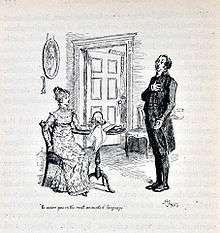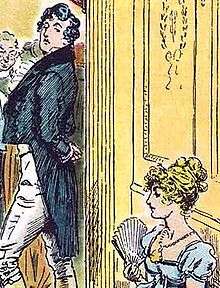Mr. William Collins

Mr. William Collins is a fictional character in the novel Pride and Prejudice by Jane Austen. He is the cousin of Mr. Bennet, and is the clergyman at the Hunsford parsonage near Rosing’s Park, the estate of his patroness Lady Catherine De Bourgh. Since Mr. and Mrs. Bennet have no sons, Mr. Collins is the current heir presumptive to the Bennet's family estate of Longbourn House.[1] Mr. Collins is first introduced during his visit to Longbourn, Mr. Bennet's estate.
Background
William Collins, who is 25 years old as the novel begins, is described as being tall and heavy. He is said to be an insensible man who was raised by “an illiterate and miserly” father, and has not been improved by education or society. Austen writes that prior to his entry into the novel, his circumstances had “originally given him great humility of manner”. However, this characteristic has been altered greatly and been replaced with arrogance and vanity due to “early and unexpected prosperity”;[2] this early prosperity came by chance at the hand of Lady Catherine de Bourgh when a vacancy arose for the living of the Hunsford parish.
He has a ridiculously high regard for Lady Catherine de Bourgh and her daughter, of whom he is “eloquent in their praise”.[3] It is partially due to his newly-gained favor with Lady Catherine and his position as a rector that he possesses so much vanity. He is described as being a "mixture of pride and obsequiousness, self-importance and humility", and all too easily defers and kowtows to his social superiors.[2] Mr. Collins is usually considered to be the foil to Mr. Darcy, who is grave and serious, and acts with propriety at all times. On the other hand, Mr. Collins acts with impropriety and exaggerated humility, which offers some comedic relief.
He likes things, especially if they are expensive or numerous, but is indifferent to beauty: "Here, leading the way through every walk and cross walk, and scarcely allowing them an interval to utter the praises he asked for, every view was pointed out with a minuteness which left beauty entirely behind. He could number the fields in every direction, and could tell how many trees there were in the most distant clump."[4]
Portrayal

Mr. Collins is first mentioned when Mr. Bennet tells his wife that his cousin will be visiting them. Mr. Bennet reads them a letter sent to him from Mr. Collins where Collins speaks of making amends for any past disagreements between his father and Mr Bennet. In his letter, Mr. Collins readily assumes that his overtures of peace will be gratefully accepted and presumes upon the family to announce that he will come stay with them for a week.
Upon the first night of his visit he spends time dining with the family and reading to them from Fordyce’s Sermons in their parlor. It is at this point that Mr. Collins seems to take a fancy to the eldest daughter, Jane Bennet. When discussing his intentions with Mrs. Bennet he is told that Jane may very soon be engaged.[2] It takes Mr. Collins only a few moments to redirect his attentions to Elizabeth Bennet, who in he believes in “birth and beauty,”[2] succeeds her sister.
He spends the rest of his stay making visits around the neighborhood with the young Misses Bennet. They visit Mrs. Phillips, Mrs. Bennet’s sister. Mr. Collins is quite charmed by this encounter and seems extremely pleased to be treated so well by the family. He continues to pay specific attention to Miss Elizabeth.
Collins first gives Elizabeth a hint of his intentions prior to the Netherfield ball hosted by Charles Bingley. He asks Elizabeth if she will allow him the pleasure of being her partner for the first two dances.[5] Though Mr. Collins quite enjoys himself during these dances, Elizabeth has entirely different feelings on the matter. Miss Elizabeth has a strong aversion for Mr. Collins. However, she usually tries to avoid any conversation beyond what is polite and proper. At the Netherfield ball she describes her dances with Mr. Collins as “dances of mortification". She comments that Mr. Collins acts awkward and solemn and gives her “all the shame and misery which a disagreeable partner for a couple of dances can give”.[5]
At the end of Mr. Collins’ weeklong visit he seeks a private audience with Miss Elizabeth. Oblivious to how Elizabeth might be feeling, Mr. Collins tells her that “almost as soon as he entered the house, he singled her out as the companion of his future life”. He also expounds upon his reasons for getting married which are:
- He 'feels' that every clergyman should set the example of matrimony in his parish.
- he believes it will add to his own personal happiness.
- Lady Catherine has 'urged' him to find a wife as quickly as possible (contradicting his first reason, cited above).[6]
When Elizabeth rejects his proposal, despite her mother's approval of the match, Collins is quite taken aback and does not believe that she is serious. Elizabeth has to tell him firmly that she is in fact serious. Mr. Collins seems surprised and insulted. He had not considered that his proposal would ever be undesirable. Miss Elizabeth has to insistently repeat to Mr. Collins that she does not intend to marry him since he believes she is really only trying to behave with propriety by refusing him. Collins only accepts her refusal once Mrs. Bennet admits that it is not likely that Elizabeth intends changing her mind.
In a few short days after this rejection, Mr. Collins’ sentiments are quickly transferred to Elizabeth’s friend Charlotte Lucas, who encourages his regard because she seeks to improve her own social position (and does not wish to remain a spinster). Since Collins has very good prospects, Charlotte is determined to gain his favor.[7] Her plan works well. A few days after this Elizabeth hears that Charlotte is now engaged to Mr. Collins. Upon hearing this news from Charlotte herself, Elizabeth declares it impossible and wonders how it is that someone could find Mr. Collins less than ridiculous, let alone choose to marry him. This engagement takes place rather quickly and later, Mr. Collins comes to visit the Bennets with his new wife to pay their respects.
A few months later Elizabeth is invited to visit Charlotte at her new home in Hunsford. Mr. Collins makes it his goal to show Elizabeth that she made a grave mistake when refusing to marry him. Later on, he seems intent on convincing the Bennets that his pride was never injured and that he never had intentions towards Miss Elizabeth or any of her sisters.[8]
Mr. Collins is only mentioned a few more times throughout the novel in passing.
Extra-textual information
Some scholarly analysis has been conducted on Jane Austen’s characterization of Mr. Collins. Possibly the most thorough examination of this character was made by Ivor Morris in his book Mr Collins Considered: Approaches to Jane Austen. Morris says "there is no one quite like Mr Collins [...] his name has become a byword for a silliness all of his own—a felicitous blend of complacent self-approval and ceremonious servility."[9] He continues to say that Austen designed Mr Collins as a flat character, yet he is one of her great accomplishments. Morris suggests that though Mr Collins has few dimensions, he is just as rounded as Sense and Sensibility's Edward Ferrars and Colonel Brandon, or Emma's Mr. Knightley and Harriet Smith.[10] In another analysis, Deirdre Le Faye wrote "what does make Mr Collins a figure of fun and rightful mockery is his lack of sense, of taste, and of generosity of spirit contrasted to his own supreme unawareness of his shortcomings in these respects".[11] He has also been criticised for taking such a casual air of his own marriage, which is one of the primary concerns of the Church.[12]
In a book review written by Dinah Birch, a professor at the University of Liverpool, she examines the role of Mr Collins as a clergyman in Jane Austen's writing. Birch says that "one of the strongest points of Pride and Prejudice is its understanding that Jane Austen's Christianity [...] is also an imaginative force in her writing," because Austen is "deeply interested in the role of the church," in her society.[13] She writes about the lack of religious dedication she sees in some clergyman through her character Mr. Collins who is "by no means an aspirant to sainthood".[14] Margaret Kirkham regards the "asinine" Mr. Collins, who will inherit Longbourn, as a way that Austen "mocks sexist pride and prejudice" in legal customs.[15]
Depictions in other media
Further information: Jane Austen in popular culture: Pride & Prejudice
Film
| Year | Actor | Role | Film | Notes |
|---|---|---|---|---|
| 1940 | Melville Cooper | Mr. William Collins | Pride and Prejudice | |
| 2003 | Hubbel Palmer | William Collins | Pride and Prejudice: A Latter-day Comedy | Modern adaptation of Pride and Prejudice |
| 2004 | Nitin Ganatra | Mr. Kholi | Bride and Prejudice | A Bollywood-style adaptation of Pride and Prejudice |
| 2005 | Tom Hollander | Mr. William Collins | Pride & Prejudice | |
| 2016 | Matt Smith | Parson Collins | Pride and Prejudice and Zombies | Based on the parody novel by Seth Grahame-Smith. |
Television
| Year | Actor | Role | Television Program | Notes |
|---|---|---|---|---|
| 1952 | Lockwood West | Mr. Collins | Pride and Prejudice | Television mini-series |
| 1967 | Julian Curry | Mr. Collins | Pride and Prejudice | |
| 1980 | Malcolm Rennie | Mr. Collins | Pride and Prejudice | |
| 1995 | David Bamber | Mr. Collins | Pride and Prejudice | |
| 2008 | Guy Henry | Mr. Collins | Lost in Austen | A fantasy adaptation of Pride and Prejudice |
| 2012 | Maxwell Glick | Ricky Collins | The Lizzie Bennet Diaries | A web series, modernized adaptation of Pride and Prejudice |
References
- ↑ Rossdale, P.S.A. (1980). "What Caused the Quarrel Between Mr Collins and Mr Bennet - Observations on the Entail of Longbourn". Notes and Queries. 27 (6): 503–504.
- 1 2 3 4 Austen, Jane (1984). Pride and Prejudice. USA: The Reader's Digest Association, Inc. pp. Chapter 15.
- ↑ Austen, Jane (1984). Pride and Prejudice. USA: The Reader's Digest Association, Inc. pp. Chapter 13.
- ↑ Austen, Jane (1995). Pride and Prejudice. New York: Modern Library. p. 115.
- 1 2 Austen, Jane (1984). Pride and Prejudice. USA: The Reader's Digest Association, Inc. pp. Chapter 18.
- ↑ Austen, Jane (1984). Pride and Prejudice. USA: The Reader's Digest Association, Inc. pp. Chapter 19.
- ↑ Austen, Jane (1984). Pride and Prejudice. USA: The Reader's Digest Association, Inc. pp. Chapter 22.
- ↑ Austen, Jane (1984). Pride and Prejudice. USA: The Reader's Digest Association, Inc. pp. Chapter 28.
- ↑ Morris, Ivor (1987). Mr. Collins Considered: Approaches to Jane Austen. London: Routledge & Kegan Paul Ltd. pp. Chapter 1: Query.
- ↑ Morris, Ivor (1987). Mr Collins Considered. London: Routledge & Kegan Paul Ltd. pp. Chapter 1: Query.
- ↑ Le Faye, Deirdre (May 1989). "Mr. Collins Considered: Approaches to Jane Austen by Ivor Morris". The Review of English Studies. 40 (158): 277–278.
- ↑ Reeta Sahney, Jane Austen's heroes and other male characters, Abhinav Publications, 1990 ISBN 9788170172710 p.76
- ↑ Birch, Dinah (1988). "Critical Intimacies". Mr-Collins Considered- Approaches to Austen, Jane- Morris, I. 37 (158): 165–169.
- ↑ Morris, Ivor (1987). Mr Collins Considered: Approaches to Jane Austen. London: Routledge & Kegan Paul Ltd. pp. Chapter 1: Query.
- ↑ Kirkham, Margaret (1986). "Introduction". Jane Austen, Feminism and Fiction. Brighton: The Harvester Press. p. xvi. ISBN 0710807503.

_hires.jpg)
.jpg)